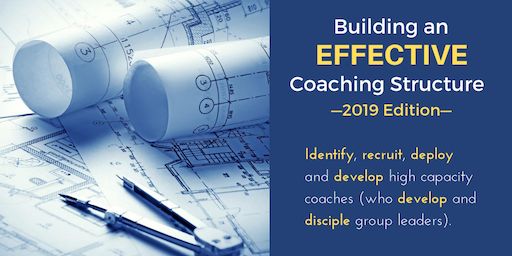The Awesome Potential of the Launch-Phase Coach Strategy
 I've written previously about how to identify a potential coach. I've also written about how to recruit a potential coach.
I've written previously about how to identify a potential coach. I've also written about how to recruit a potential coach.
In post I want to help you to develop a basic job description for a "launch-phase" coach. But before I get into developing a job description, I want to lay out a little philosophy that will help you understand the potential of a launch-phase coach.
The Awesome Potential of the "Launch-Phase" Coach Strategy
I tripped across this idea several years ago. We were preparing for a church-wide campaign and knew we'd need a lot of help caring for a lot of brand new leaders. We also knew that the brand new leaders who needed care would largely be people who had simply volunteered to open up their home for 6 weeks, serve a simple snack, and tell a few of their friends (We had used the HOST strategy to recruit these new leaders).
Knowing that we would have a lot of brand new leaders who probably wouldn't know a lot about leading a group, we decided to recruit some existing leaders to simply walk alongside these new leaders for about 10 weeks (a week or two before the 6 week study began, the 6 weeks of the study, and a week or two on the backside to try and help these new groups decide to continue meeting).
When it came to identifying the right existing leaders to step into this 10 week commitment to help the new leaders get started, we essentially did what you learned yesterday (we sifted through our list of existing leaders, looking for the ones we felt had what it took to do what we needed them to do). Once we had identified the right existing leaders we recruited them to help us, inviting them to make a 10 to 13 week commitment to help 2 or 3 newbie group leaders for the upcoming campaign (you'll be learning how to recruit in lesson 13).
Two Important Unanticipated Benefits of the Launch-Phase Coach Strategy
I want you to really catch what I'm about to tell you. Don't miss it. These are benefits that we really tripped across. We did not see them coming.
First, when you recruit potential coaches to help you for a short season (10 to 13 weeks) you are really appealing to the same built-in level of willingness that prompts someone to commit to host a small group for the 6 weeks of the church-wide campaign. In the case of the small group host, they're able to rationalize that "it's just 6 weeks." In the case of the launch-phase coach, they're able to rationalize that "it's just 10 weeks."
Are you following me? One important unanticipated benefit of the launch-phase coach strategy turned out to be that because it was "just a 10 week commitment" we were able to recruit lots of the right people to "help a few newbie leaders for 10 weeks."
The second unanticipated benefit? We were able to recruit lots of the right people to a short window of responsibility that allowed us to observe them in action before we invited them to a long-term commitment. In a sense, we were taking them out for a test-drive. Why is that important? Easy. Once you learn to recruit this way (to a short-term limited responsibility and commitment), you will very rarely invite the wrong person into a longer-term and much more important responsibility and commitment.
Developing the Right Job Description for a Launch-Phase Coach
Okay, now with that background information, let's get on with today's assignment: developing a basic job description for a launch-phase coach.
Step One: Take a look at a sample launch-phase coach job description
Click here to see a sample copy of a launch-phase coach job description.
Take a few minutes to look over the sample I've provided.
- You'll notice that it includes a very simple, one-sentence purpose statement. We will actually use this document when we recruit launch-phase coaches and we want the purpose to be clear from the beginning.
- The job description has a simple set of responsibilities. It's not complicated.
- Notice that we included some expectations about an end in mind. The job responsibilities have a definite start and stop written in.
- A set of non-negotiable qualifications is also written in.
Step Two: Write your own job description
Feel free to use the sample as a guide. You'll obviously want to customize it to fit your situation (the sample was customized to fit our campaign timeline).
Building an effective coaching structure is one of the most important components of building a thriving small group ministry. While you will learn a many of the most important elements straight from my blog posts, you may want to take my most popular mini-course: Building an Effective Coaching Structure.
Image by Joe Wolf


